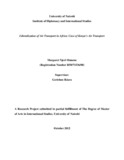| dc.description.abstract | The air transport industry plays a major role in world economic activities and remains one of the
fastest growing sectors of the world economy. Liberalization of air transport has therefore
become a worldwide challenge and more especially in the African Continent. The project sought
to determine and assess the challenges to the full implementation of liberalization of air transport in Kenya.
The target population comprised 110 key senior officers drawn from the Ministry of Transport,
Kenya Civil Aviation Authority (KCAA) and the airlines. The study was descriptive in nature
involving the administration of a self-administered survey questionnaire. The stratified sampling
technique was adopted for selecting a sample of 55 respondents which comprised 50% of the entire population. A questionnaire was used to collect data. The analysis of the collected data involved descriptive and inferential statistics and the results are presented by use of tables,
graphs and charts.
The study revealed a lack of proper understanding of liberalization of air transport meaning that
the implementation legal instruments such as COMESA Legal Notice No 2 and Yamoussoukro
Decision are not fully understood and the stakeholders have not been sensitized. Airlines believe
that the beneficiaries of liberalization are only consumers and foreign airlines whereas the regulators think that the beneficiaries of liberalization are airlines and consumers. Market forces
such as tariffs, costs of operations, customer preferences and characteristics, fuel prices and
focus on security influence liberalization. The study also revealed the existence of political
interference when it comes to market access. Most (70%) respondents believe that competition is
an issue in a liberalized air transport sector and it is likely to cut down their business.
Regulation was also found to be a major issue in liberalization of air transport in Kenya;
personnel competencies, lack of proper institutions, and rigid regulations. The airlines are not familiar with the regional instruments that govern liberalization with a perception that the Civil
Aviation Act, CAP 394 is adequate in dealing with liberalization and competition whereas there is no local legislation on liberalization. The study concluded that market factors had an influence
on liberalization of the air transport industry. There is an overlap between the functions of the Ministry of Transport and KCAA which poses conflict of interests and confusion. Fear of
competition among airlines is real and has hindered them from appreciating the benefits of
liberalization.
The study recommends that regulators sensitize the operators on the concept of liberalization to
create understanding and avoid the myths surrounding the concept. Further KCAA and the
Ministry of Transport should immediately formulate and enact relevant policies and guidelines to
liberalize the air transport in Kenya to the general benefit of the industry. The KCAA should
create a platform bringing together all stakeholders in the air transport industry to speed up
liberalization. It is also recommended that airlines form alliances to enable them compete with
foreign airlines favourably in a liberalized market. The Government of Kenya should clearly
define the roles key stakeholders in the liberalization efforts of the air transport industry in Kenya. | en_US |

